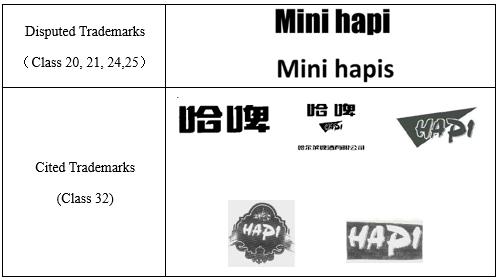


Briefing the case
The applicant, Budweiser Harbin Beer Co., LTD., has filed an application for the invalidation of following trademarks, including the trademarks "Mini hapi" with trademark No.: 31830069, 32830943, 32993820, 31846311, and the trademarks "Mini hapis " with trademark No.: 43031063, 43009909, 43009930, 43022596 under the name of Wang Bin, recently, received a favorable ruling on the case of the invalidation of the above trademarks. After hearing the case, the Commercial Juries of China National Intellectual Property Administration (CNIPA) concluded that the registration of the above disputed trademarks have constituted the situation of "obtaining registration by other improper means" as referred to in the first paragraph of Article 44 of the Trademark Law.

Analysis to the case
The applicant Budweiser Harbin Beer Co., Ltd. is a well-known beer manufacturer in China. Harbin Beer produced by Budweiser is the earliest beer brand in China, which is still popular throughout the country. The applicant's trademark "哈尔滨" (Harbin in Chinese characters) has been recognized by the court and the CNIPA for many times as the well-known trademark of "beer" goods, but "哈啤" (HAPI in Chinese characters) and "HAPI" have not been recognized as the well-known trademarks. Even if we emphasize that "哈啤" (Hapi in Chinese characters) and "Hapi" are short for "Harbin Beer" and have corresponding relationship, they should also have the influence of well-known trademark. However, the evidence provided by the applicant is mostly about "Harbin Beer", so it is difficult to prove that "HAPI" has a corresponding relationship with "哈尔滨啤酒" (Harbin Beer in Chinese characters) and also has the influence of well-known trademarks. Moreover, Class 20, 21, 24 and 25 goods approved by the disputed trademark have a weak correlation with the well-known "啤酒" (Beer in Chinese characters) goods on which the cited trademark relies. The probability of success to break through the classification table or apply the protection of Article 13 is not very high. In combination with the provisions and rulings issued by the CNIPA in recent years, the CNIPA has intensified its crackdown on malicious trademark registration. Therefore, after weighing the advantages and disadvantages, we decide to take the respondent's malicious trademark application as the breakthrough in the case. The malicious acts of the respondent are emphasized in the statement of the grounds.
After inquiry, there are 24 trademarks under the name of the respondent, in addition to 11 "Mini hapi" and "Mini hapis" series trademarks similar to the applicant's trademarks, the respondent also imitates other people's commercial logos with strong significance, including the applications for registrations of two trademarks “ DR. DUCK’S and design” that are identical to American guitar care brand Axe Duck DR.DUCK's, other three "MERRYBONBON" trademarks that are identical to Korean home store MERRYBONBON, also three trademarks corresponding to the sound of "Mary Stick". The pattern and details of the logo are the same, which is not a coincidence. The above-mentioned trademark registration acts of the respondent have the intention of obviously copying or copying another person's trademark with strong significance, which violates the principle of good faith, does not have the legitimacy of registered trademark, disturbs the order of trademark registration management, and damages the public interests. Therefore, the registration of the disputed trademark constitutes a case of "obtaining registration by other improper means" as referred to in Article 44.1 of the Trademark Law.
Legal Basis
The Guide for Trademark Trial and Examination issued by CNIPA in 2021 clearly stipulates the circumstances under which "registration is obtained by other improper" means:
(1) The applicant for disputed trademark applies for the registration of multiple trademarks, which are identical with or similar to others' trademarks with certain popularity or strong and distinctive features;
(2) Where the applicant for disputed trademark applies for registration of more than one trademark, which has the same or similar composition with the business name, the name of an enterprise, the name of a social organization or other institution, the name of a commodity with certain influence, the packaging, the decoration, etc.;
(3)Other circumstances under which registration may be deemed to have been obtained by improper means.
Conclusions
1. The applicant for disputed trademark applies for registration of multiple trademarks, which are identical with or similar to others' trademarks with certain popularity or strong and distinctive features, including a variety of circumstances:
Only mass registration, hundreds or even thousands of pieces;
A particularly large or relatively large number of trademarks that are identical or similar in composition to those of others with certain popularity or strong and distinctive features;
The amount is generally not even large, but the malicious intent is obvious, such as the exact copy of the applicant's trademark drawing including special color, special font design, etc.;
Repeated registration of the same subject, etc
There are 24 trademarks under the name of the respondent in this case, which is not a large number, but 11 "Mini hapi" and "Mini hapis" are similar to the applicant's trademark ‘hapi’. In addition, there are 8 trademarks with the same commercial logo design as others, which is exactly obvious malicious behavior. The reference significance of this case is that for those trademarks that have a certain level of popularity but have not yet reached the level of well-known trademarks, which cannot break through the classification table or apply the protection stipulated by Article 13, but are cases in which the registrant of the disputed trademark applies for registration of identical or highly similar trademarks in other different classes, it may apply to Article 44.1, "Obtaining registration by other improper means" of the Trademark Law.
2. The ruling that the trademark applicant has engaged in the malicious registration of trademarks has also had a certain impact on the trial of the later cases. For example, before the above invalidation case, the applicant filed an invalidation declaration against the trademark "Mini hapi" No. 31910545 in the respondent's name on 25th September 2020. After the trial, CNIPA has determined that the registration of a disputed trademark constitutes the acquisition of registration by any other improper means referred to Article 44.1 of the Trademark Law. In the subsequent invalidation cases of "mini hapi" and "mini hapis", CNIPA found that the circumstances constituted the acquisition of registration by other improper means referred to in Article 44.1.
3. While CNIPA has intensified efforts to crack down on malicious trademark registrations, the malicious behaviors of trademark applicants have become more and more hidden, such as combining different brands together, applying separately for the same brand, and registering the names of Taobao stores, which demands agents to fully explore the malicious behaviors of trademark applicants of the other party. In addition to the general search on Baidu and 360, also log in Taobao, Jingdong and other e-commerce platforms to search for brand information.
In conclusion, agents should fully grasp the direction of review, focus on writing the case reasons, and strive for the most favorable results for customers.
 业务领域:
业务领域: 此案件代理人
此案件代理人
